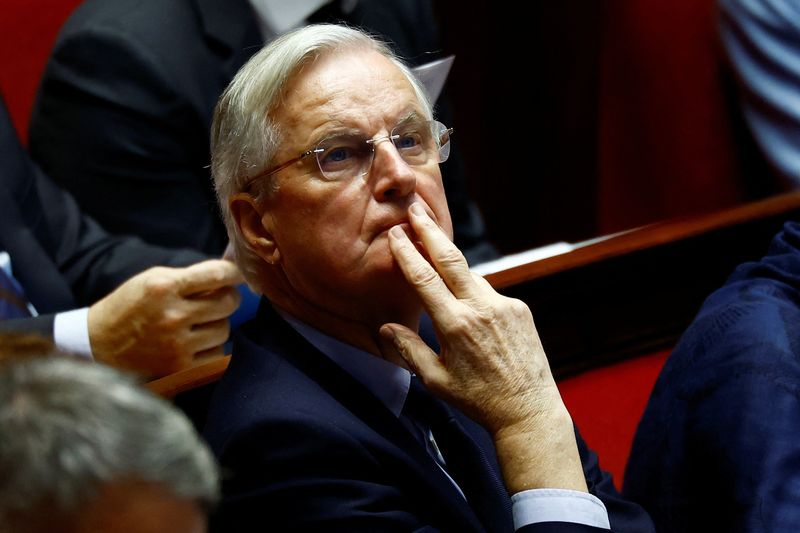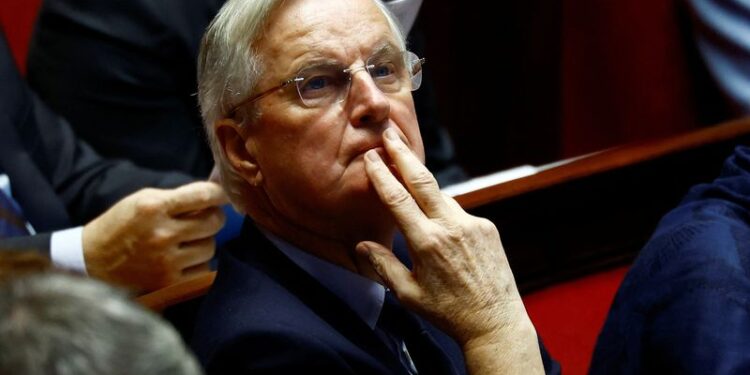By Benoit Van Overstraeten and Diana Mandia
PARIS (Reuters) -French lawmakers are all but certain to oust the government with a no-confidence motion on Wednesday, plunging the euro zone’s second-biggest economic power deeper into political turmoil.
Barring a last-minute surprise, Prime Minister Michel Barnier’s government will be France’s first to be forced out by a no-confidence vote in more than 60 years, at a time when the country is struggling to tame a massive budget deficit.
That would leave a hole at the heart of the European Union at a time when Germany is also weakened and in election mode, weeks before U.S. President-elect Donald Trump re-enters the White House.
In a TV interview on Tuesday, Barnier said he still believed his government could survive the vote, scheduled for the evening after a debate starting at 4 p.m. (1500 GMT).
But far-right National Rally (RN) chief Jordan Bardella confirmed on Wednesday that his party would vote to topple Barnier alongside left-wing parties.
He said Barnier’s optimism showed that the government was “completely out of touch with what is happening in the country”.
“This government is dangerous for my country,” he told France Inter radio. “We will vote for the no-confidence motion.”
Barnier’s interior minister, Bruno Retailleau, was downbeat.
“Nothing’s over until the vote but we can see we’re headed towards censure (of the government),” he told CNews.
President Emmanuel Macron, who won a second mandate in 2022, precipitated the crisis by calling a snap parliamentary election in June.
His term as president runs until mid-2027 and he cannot be forced out by parliament, but the RN and the hard left have already been saying he should resign as he faces his biggest crisis since the Yellow (OTC:) Vest popular unrest of 2018-2019.
Since Macron called the election, 40 has dropped nearly 10% and is the heaviest loser among top EU economies. The single currency is down nearly 4%.
NO-CONFIDENCE VOTE PUTS BID TO CUT BUDGET DEFICIT AT RISK
Political uncertainty is already hitting France’s services sector, a monthly survey showed.
“The positive signals … that were seen over the summer, partly due to the Olympics, are now a thing of the past,” Hamburg Commercial Bank economist Tariq Kamal Chaudhry said after seeing the HCOB purchasing managers’ index for France’s service sector.
Barnier’s draft budget had sought to cut the fiscal deficit, which is projected to exceed 6% of national output this year, with 60 billion euros ($63 billion) in tax hikes and spending cuts. It sought to drag the deficit down to 5% next year.
The caretaker government could propose emergency legislation to roll over spending limits and tax provisions from this year. But that would mean Barnier’s savings measures falling by the wayside.
Barnier says the consequences of voting him out will be catastrophic for state finances, but RN lawmaker Laure Lavalette told TF1 TV: “There is no reason for this to lead to major chaos. Don’t play with fears … it’s not all going to crumble.”
Bond investors are likely to spare France the dire financial “storm” Barnier has warned of, but the fallout from the political crisis will hurt businesses, consumers and taxpayers, economists and experts say.
“This is a slow-burning crisis which will lead to an ongoing widening of spreads and an ongoing deterioration of sovereign creditworthiness,” said Union Investment’s head of fixed income and FX, Christian Kopf, who is underweight on French debt.

“But for the time being, I do not see the ingredients for this to totally get out of hand and morph into an outright sovereign debt crisis.”
If the no-confidence vote passes, Macron may well ask Barnier to stay on in a caretaker role as it could take until next year to find a new prime minister.







